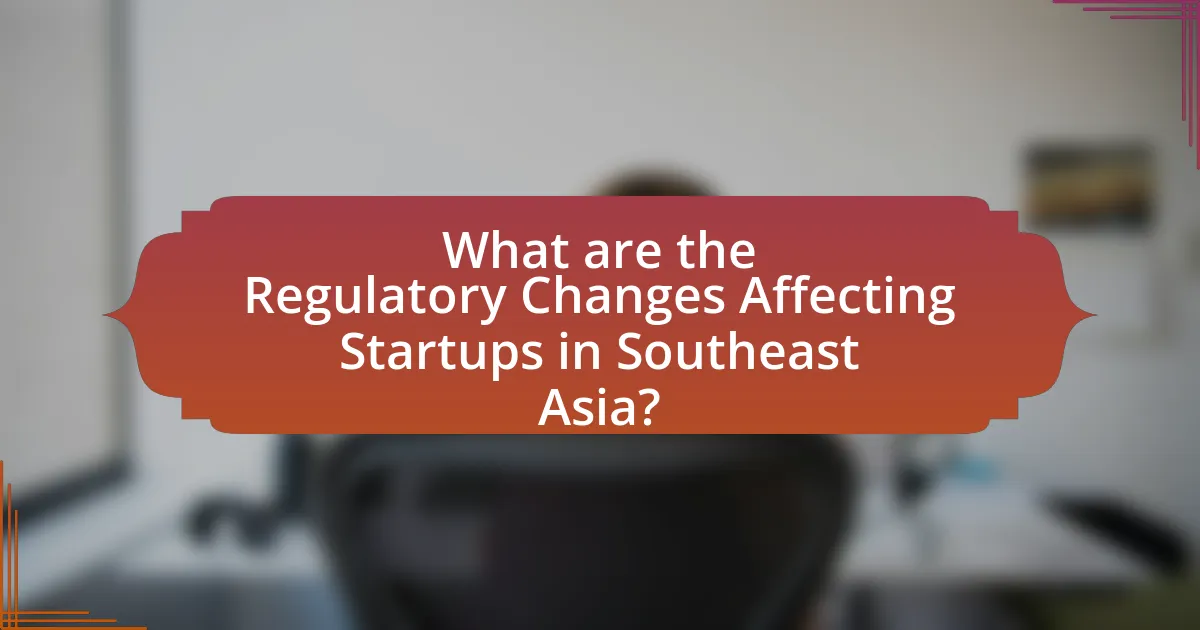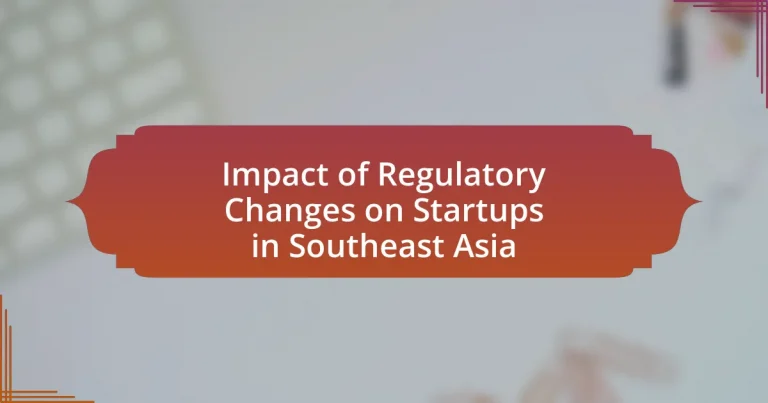The article examines the impact of regulatory changes on startups in Southeast Asia, highlighting the introduction of new digital economy laws, enhanced data protection regulations, and streamlined business registration processes. It discusses the variations in regulatory frameworks across countries such as Singapore, Indonesia, Malaysia, and the Philippines, and how these differences influence startup growth, funding opportunities, and operational compliance. The article also addresses the challenges startups face due to increased compliance costs and operational disruptions, while emphasizing the potential for innovation that regulatory changes can create. Additionally, it outlines strategies for startups to navigate these regulations effectively and leverage them for competitive advantage.

What are the Regulatory Changes Affecting Startups in Southeast Asia?
Regulatory changes affecting startups in Southeast Asia include the introduction of new digital economy laws, enhanced data protection regulations, and streamlined business registration processes. For instance, countries like Singapore have implemented the Personal Data Protection Act, which mandates strict data handling practices, impacting how startups manage customer information. Additionally, the ASEAN Economic Community has facilitated cross-border trade and investment, encouraging startups to expand regionally. These changes aim to create a more conducive environment for innovation and entrepreneurship while ensuring compliance with international standards.
How do these regulatory changes vary across different countries in Southeast Asia?
Regulatory changes across different countries in Southeast Asia exhibit significant variation in terms of their scope, implementation, and impact on startups. For instance, Singapore has implemented a pro-business regulatory framework that includes tax incentives and streamlined processes for company registration, fostering a vibrant startup ecosystem. In contrast, Indonesia has introduced regulations aimed at protecting local businesses, which can create barriers for foreign startups seeking to enter the market. Malaysia has focused on enhancing digital economy regulations, promoting e-commerce while ensuring consumer protection. The Philippines has seen regulatory changes that aim to improve ease of doing business, yet challenges remain in bureaucratic processes. These differences reflect each country’s unique economic priorities and regulatory environments, influencing how startups navigate their respective markets.
What specific regulations have been introduced recently in key markets?
Recently, key markets in Southeast Asia have introduced regulations aimed at enhancing digital economy frameworks and consumer protection. For instance, Singapore implemented the Personal Data Protection Act (PDPA) amendments in 2022, which strengthen data privacy and impose stricter penalties for non-compliance. Additionally, Indonesia’s Ministry of Communication and Information Technology introduced the Electronic Information and Transactions Law (ITE Law) revisions in 2023, focusing on online content regulation and cybersecurity measures. These regulations reflect a broader trend towards stricter governance in digital spaces, ensuring consumer rights and data security are prioritized in the rapidly evolving startup ecosystem.
How do these regulations impact the startup ecosystem in each country?
Regulations significantly impact the startup ecosystem in Southeast Asian countries by shaping the operational landscape for new businesses. For instance, in Singapore, the regulatory framework promotes innovation through tax incentives and grants, fostering a vibrant startup culture, evidenced by its ranking as one of the top global startup hubs. Conversely, in Indonesia, complex regulations and bureaucratic hurdles can stifle entrepreneurial activity, leading to a slower growth rate in startups compared to more streamlined environments. In Malaysia, recent regulatory reforms aimed at digital economy initiatives have encouraged investment in tech startups, reflecting a positive shift in the ecosystem. Overall, the nature of regulations—whether supportive or restrictive—directly influences the growth, sustainability, and attractiveness of the startup landscape in each country.
Why are these regulatory changes significant for startups?
Regulatory changes are significant for startups because they can directly influence the operational landscape, funding opportunities, and compliance requirements. For instance, new regulations may streamline business registration processes, reducing the time and cost for startups to enter the market. Additionally, favorable regulatory environments can attract foreign investment, as seen in countries like Singapore, which has implemented policies to support tech startups, resulting in a 25% increase in venture capital funding from 2019 to 2021. These changes can also enhance consumer trust and market stability, which are crucial for the growth and sustainability of startups in Southeast Asia.
What challenges do startups face due to new regulations?
Startups face significant challenges due to new regulations, including increased compliance costs, operational disruptions, and limited access to funding. Compliance costs can escalate as startups must allocate resources to meet regulatory requirements, which diverts funds from growth initiatives. Operational disruptions occur when startups must alter their business models or practices to align with new regulations, potentially leading to delays in product launches or service delivery. Additionally, stringent regulations can deter investors, making it harder for startups to secure funding, as investors may perceive increased risk associated with regulatory compliance. For instance, a study by the World Bank in 2021 highlighted that startups in Southeast Asia reported a 30% increase in operational costs due to new regulatory frameworks, underscoring the financial burden imposed by such changes.
How can regulatory changes create opportunities for innovation?
Regulatory changes can create opportunities for innovation by establishing new frameworks that encourage startups to develop novel solutions. For instance, when governments introduce regulations that promote sustainability, startups can innovate in green technologies to comply with these new standards. A notable example is the European Union’s General Data Protection Regulation (GDPR), which spurred innovation in data privacy solutions and compliance tools across various sectors. This regulatory shift not only created a market for new products but also incentivized existing companies to enhance their offerings, demonstrating how regulatory changes can drive innovation by opening new avenues for business development.

How do Regulatory Changes Influence Startup Growth and Development?
Regulatory changes significantly influence startup growth and development by altering the operational landscape in which these businesses function. For instance, favorable regulations can reduce barriers to entry, enabling startups to access funding, resources, and markets more easily. In Southeast Asia, countries like Singapore have implemented supportive policies, such as tax incentives and streamlined business registration processes, which have led to a surge in startup activity; the Global Startup Ecosystem Report 2023 highlights Singapore as a leading hub for innovation due to its regulatory environment. Conversely, stringent regulations can stifle growth by increasing compliance costs and limiting market opportunities, as seen in some sectors within Indonesia, where complex regulations have hindered startup scalability. Thus, the nature of regulatory changes directly impacts the ability of startups to thrive and innovate in their respective markets.
What are the direct effects of regulatory changes on startup funding?
Regulatory changes directly affect startup funding by altering the investment landscape, influencing both the availability of capital and investor confidence. For instance, stricter regulations can limit the types of funding sources available, such as venture capital or crowdfunding, thereby reducing the overall pool of financial resources for startups. Conversely, favorable regulatory environments, such as tax incentives or streamlined compliance processes, can enhance investor interest and increase funding opportunities. A study by the World Bank in 2021 highlighted that countries with supportive regulatory frameworks saw a 30% increase in startup investments compared to those with stringent regulations. This demonstrates that the nature of regulatory changes significantly impacts the flow of capital into startups.
How do regulations affect investor confidence in startups?
Regulations significantly influence investor confidence in startups by establishing a framework that ensures transparency, accountability, and legal protection. When regulations are clear and supportive, they reduce perceived risks associated with investing in startups, thereby attracting more investors. For instance, a study by the World Bank in 2020 indicated that countries with robust regulatory environments saw a 30% increase in foreign direct investment in startups compared to those with weaker regulations. This correlation demonstrates that effective regulations can enhance investor trust and willingness to engage with emerging businesses.
What funding sources are most impacted by regulatory changes?
Venture capital and angel investments are the funding sources most impacted by regulatory changes. Regulatory shifts can alter investment criteria, affect the availability of funds, and influence investor confidence. For instance, changes in securities regulations can restrict the ability of startups to raise capital through public offerings or crowdfunding, directly affecting the flow of venture capital. Additionally, stricter compliance requirements can deter angel investors, who may prefer less bureaucratic environments. Historical data shows that in regions with significant regulatory changes, such as Southeast Asia, there has been a notable decline in venture capital investments, highlighting the sensitivity of these funding sources to regulatory environments.
How do regulatory changes affect startup operations and compliance?
Regulatory changes significantly impact startup operations and compliance by altering the legal framework within which these businesses operate. Startups must adapt their business models, processes, and compliance strategies to align with new regulations, which can include changes in taxation, labor laws, and industry-specific requirements. For instance, a study by the World Bank indicates that regulatory reforms can either facilitate or hinder business growth, depending on how effectively startups can navigate these changes. Compliance with new regulations often requires additional resources, such as hiring legal experts or investing in compliance technology, which can strain a startup’s limited budget. Therefore, the ability to swiftly adapt to regulatory changes is crucial for maintaining operational efficiency and ensuring legal compliance in a dynamic market environment.
What compliance challenges do startups encounter with new regulations?
Startups encounter several compliance challenges with new regulations, including limited resources, lack of expertise, and rapidly changing legal landscapes. Limited resources hinder startups from hiring specialized compliance personnel or investing in compliance technology, which is essential for navigating complex regulations. The lack of expertise often leads to misunderstandings or misinterpretations of regulatory requirements, increasing the risk of non-compliance. Additionally, the rapidly changing legal landscapes in Southeast Asia require startups to continuously adapt their operations, which can be overwhelming and costly. These challenges are compounded by the fact that many startups operate in multiple jurisdictions, each with its own set of regulations, further complicating compliance efforts.
How can startups effectively navigate regulatory requirements?
Startups can effectively navigate regulatory requirements by conducting thorough research on applicable laws and regulations in their industry and region. This involves understanding local, national, and international regulations that may impact their operations, such as licensing, taxation, and labor laws. Engaging with legal experts or consultants who specialize in regulatory compliance can provide tailored guidance and help identify potential pitfalls. Additionally, startups should establish a compliance framework that includes regular audits and updates to ensure adherence to changing regulations. For instance, in Southeast Asia, countries like Singapore have specific regulatory bodies that offer resources and support for startups, which can be leveraged to stay informed and compliant.

What Strategies Can Startups Employ to Adapt to Regulatory Changes?
Startups can employ several strategies to adapt to regulatory changes, including proactive compliance monitoring, engaging with regulatory bodies, and leveraging technology for compliance management. Proactive compliance monitoring allows startups to stay informed about regulatory updates and assess their impact on operations. Engaging with regulatory bodies fosters relationships that can provide insights and guidance on compliance requirements. Additionally, leveraging technology, such as compliance management software, can streamline processes and ensure adherence to regulations efficiently. These strategies are essential for navigating the dynamic regulatory landscape in Southeast Asia, where regulations can frequently change, impacting business operations and growth.
How can startups leverage regulatory changes to their advantage?
Startups can leverage regulatory changes to their advantage by adapting their business models to align with new regulations, thus gaining a competitive edge. For instance, when Southeast Asian governments introduce favorable policies for digital payments or e-commerce, startups can quickly pivot to incorporate these technologies, attracting customers and investors. A specific example is the introduction of the ASEAN Economic Community, which has facilitated cross-border trade and investment, allowing startups to expand their market reach. By staying informed and agile, startups can capitalize on these regulatory shifts to innovate and grow their businesses effectively.
What best practices should startups adopt in response to regulatory shifts?
Startups should adopt proactive compliance strategies in response to regulatory shifts. This includes regularly monitoring regulatory changes, engaging legal experts for guidance, and implementing robust compliance programs. For instance, a study by the World Bank highlights that startups that actively adapt to regulatory environments can reduce operational risks and enhance their market position. Additionally, establishing clear communication channels with regulatory bodies can facilitate better understanding and quicker adaptation to new regulations, as evidenced by successful startups in Southeast Asia that have navigated complex regulatory landscapes effectively.
How can startups engage with policymakers to influence future regulations?
Startups can engage with policymakers to influence future regulations by actively participating in public consultations and providing data-driven insights on their industry. By presenting case studies and empirical evidence, startups can demonstrate the potential impact of proposed regulations on innovation and economic growth. For instance, a study by the World Bank highlights that regulatory frameworks that consider input from startups can lead to more effective policies that foster entrepreneurship. Additionally, forming coalitions with other businesses can amplify their voice, making it easier to advocate for favorable regulatory changes.
What resources are available for startups to understand regulatory changes?
Startups can utilize several resources to understand regulatory changes, including government websites, industry associations, legal firms specializing in startup law, and online platforms that aggregate regulatory updates. Government websites, such as those of the Ministry of Trade or local regulatory bodies, provide official information on new laws and regulations. Industry associations often publish guidelines and analysis relevant to specific sectors, helping startups navigate compliance. Legal firms offer tailored advice and insights into regulatory implications for startups, while online platforms like regulatory news aggregators deliver timely updates on changes across various jurisdictions. These resources collectively ensure that startups remain informed and compliant with evolving regulations in Southeast Asia.
Which organizations provide support and guidance for navigating regulations?
Organizations that provide support and guidance for navigating regulations include the World Bank, the International Finance Corporation (IFC), and local chambers of commerce. The World Bank offers resources and reports that help startups understand regulatory environments, while the IFC provides advisory services specifically aimed at improving the business climate in developing regions, including Southeast Asia. Local chambers of commerce often have tailored programs and resources to assist startups in complying with local regulations and navigating bureaucratic processes. These organizations are recognized for their roles in fostering entrepreneurship and supporting businesses in understanding and adapting to regulatory changes.
How can startups stay informed about ongoing regulatory developments?
Startups can stay informed about ongoing regulatory developments by subscribing to industry newsletters, attending relevant workshops and seminars, and engaging with legal experts. These methods provide timely updates on changes in regulations that directly affect their operations. For instance, organizations like the ASEAN Business Advisory Council regularly publish reports and updates on regulatory changes in Southeast Asia, which can be invaluable for startups. Additionally, utilizing platforms such as LinkedIn to follow regulatory bodies and industry leaders can enhance awareness of emerging trends and compliance requirements.
What are the common pitfalls startups should avoid regarding regulatory compliance?
Startups should avoid the common pitfalls of neglecting regulatory research, failing to implement compliance processes, and underestimating the importance of ongoing training. Neglecting regulatory research can lead to non-compliance with local laws, which may result in fines or legal action; for instance, a survey by the World Bank indicated that 60% of startups in Southeast Asia faced regulatory challenges due to lack of awareness. Failing to implement compliance processes can create gaps in adherence to regulations, leading to operational disruptions; a study by Deloitte found that 70% of startups that lacked structured compliance frameworks experienced significant setbacks. Lastly, underestimating the importance of ongoing training can result in employees being unaware of regulatory changes, which can jeopardize compliance; research from PwC shows that companies with regular compliance training programs are 50% less likely to face regulatory penalties.
What mistakes have other startups made in response to regulatory changes?
Startups in Southeast Asia have often made the mistake of failing to adapt their business models promptly in response to regulatory changes. For instance, when the Monetary Authority of Singapore introduced new guidelines for digital payment services, several fintech startups continued operating under their previous models, leading to compliance issues and financial penalties. Additionally, startups have underestimated the importance of engaging with regulatory bodies, resulting in a lack of clarity about compliance requirements, which has caused operational disruptions. A notable example is the ride-hailing service that faced significant fines for not adhering to local transportation regulations, highlighting the critical need for proactive regulatory engagement.
How can startups ensure they remain compliant while innovating?
Startups can ensure compliance while innovating by integrating regulatory considerations into their product development processes. This involves conducting thorough research on applicable laws and regulations specific to their industry and region, such as data protection laws, consumer rights, and industry-specific regulations in Southeast Asia. For instance, the General Data Protection Regulation (GDPR) in Europe has influenced data privacy laws in Southeast Asia, prompting startups to adopt similar compliance measures. Additionally, engaging legal experts during the innovation phase can help identify potential compliance risks early, allowing startups to adjust their strategies accordingly. Regular training for employees on compliance issues and establishing a compliance management system can further reinforce adherence to regulations while fostering an innovative culture.




